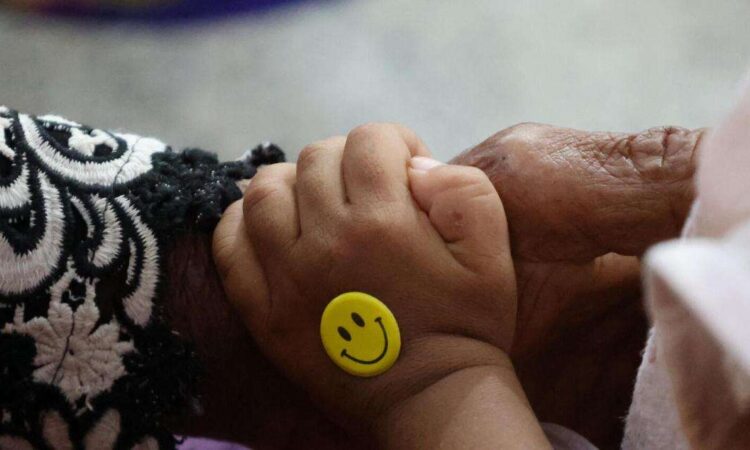
Malnutrition
Malnutrition is a persistent risk to children in Yemen. The country sees seasonal and annual peaks, usually linked to the lean season caused by the disruption of agricultural production in rural areas. This pattern was seen before the escalation of the war in late 2014, but has since worsened due to the ongoing conflict, which has exacerbated food insecurity for already vulnerable people.
There are many underlying causes for malnutrition in Yemen that extend beyond just food insecurity. Many families in Yemen can’t afford enough nutritious food. The country’s deepening economic crisis has caused prices to soar. Many people do not have access to paid work or have lost their homes due to the war. The cost of food and transportation, including fuel, are rising, which further impedes people’s access to sufficient food.
There is also great need to increase access to information for prenatal care and postnatal care, which are directly linked to preventing malnutrition. Moreover, there is limited awareness in the community about the importance of breastfeeding and routine vaccinations for children. Parents also don’t have access to information about identifying the initial symptoms of malnutrition, which delays its detection.
MSF does not have a countrywide overview of people’s nutritional status in Yemen as we are not present in all of its 21 governorates, and no large-scale nutritional surveys have been conducted. However, in several of the governorates where we are currently running projects, we are witnessing a concerning increase in the number of malnourished children with medical complications in our facilities.
With the early onset of the malnutrition peak in 2022, high admissions overwhelmed our facilities and necessitated emergency intervention in some locations to manage the surge in acute malnutrition cases and related health complications. In Khamir, Amran governorate, our team noted a 65 percent increase in admissions in 2023 compared to the same period in 2022.
Malnutrition will continue to be an issue of concern in Yemen, as it causes preventable deaths, particularly for children under five years old. Health authorities, humanitarian organizations, and other health actors must work on a comprehensive response that aims to reinforce the scope and efficiency of nutritional surveillance countrywide, to improve data analysis, and to address gaps in primary health care facilities in order to anticipate and prevent peaks of malnutrition. It is also important to help build community health awareness to detect the early signs of malnutrition cases.
Vaccine-preventable diseases
One of Yemen’s fastest-growing problems is that there have been multiple outbreaks of vaccine-preventable diseases. The country recorded more than 22,000 measles cases in 2022, including 161 deaths. In 2023 to date, cases have already spiked to 9,418, with 77 children dead.
Cases of tetanus, diphtheria, and pertussis, or whooping cough, are also on the rise, as are deaths from each disease. Moreover, the lack of immunization has had a major negative socio-economic impact on households, which face unaffordable hospitalization costs. With the rapid decline in immunization coverage, an atypically high mortality rate is expected to increase, especially if malnutrition rates continue to rise.
Our teams in Yemen are responding to the increase in measles cases across several governorates (Saada, Amran, Hodeida, Hajjah, Al Bayda, Ibb, Taiz, and Shabwa) by opening new isolation units, extending bed capacity in isolation wards, and supporting case management in health facilities at primary and secondary levels as well as through mobile clinics. In the Ministry of Health’s Al Thawra Hospital in Al-Hudaydah City, MSF is supporting an isolation unit for measles case management. Of 306 suspected measles cases received from mid-July to November last year, 85 patients (35 percent) presented with acute malnutrition. Of all measles patients, only 15 percent had received a measles-containing vaccine before their admission, indicating the low vaccination coverage.
While measles cases continue to increase, many cases are still under-reported. Other massive challenges include the anti-vaccination narrative in the north of the country, no possibility for health actors to run vaccination campaigns, restrictions in the supply and transport of vaccines to remote areas, lack of health awareness, and poor primary health care services. The situation is putting millions of children in danger.
MSF is calling on the Ministry of Health and other authorities, international donors, and the humanitarian and development communities to improve routine vaccinations at the primary health care level in order to avoid the emergence of preventable diseases. This should be supported by a scale-up in vaccination activities across governorates, especially targeting children under five who remain the most vulnerable. Activities must also include awareness-raising messages to tackle the negative perception of vaccination within communities.
Mother and child care
As is the case in most countries, women and children are among the most vulnerable groups of the population. This vulnerability has been exacerbated during the war. After nine years of conflict, in most governorates where MSF works in Yemen, there is an ever-increasing demand for maternal and child health care, which is one of the main components of our operations in the country. In 2022, we assisted more than 184,730 births, compared to 31,973 in 2021.
Many mothers, children, and newborns die upon arrival at hospitals, including those we run or support. Factors contributing to the high death rates mostly relate to the war. They include an insufficient number of functioning health facilities and their inaccessibility due to insecurity.
Women and children are also the most affected among people with chronic diseases. In Al-Qanawis Mother and Child Hospital in Al-Hudayda governorate, our team noted that there were complications in more than 17 percent of all deliveries in the year.






